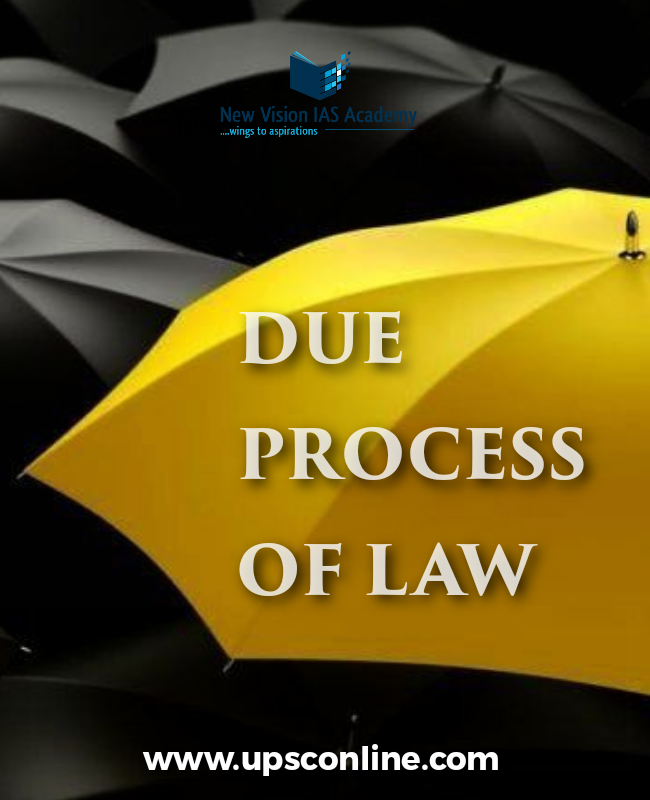DUE PROCESS OF LAW
Due process is interpreted here as the right to be treated fairly, efficiently and effectively by the administration of justice.
The rights to due process place limitations on laws and legal proceedings, in order to guarantee fundamental fairness and justice.
It is interpreted as the rules administered through courts of justice in accordance with established & sanctioned legal principles & procedures, and with safeguards for the protection of individual rights
It is interpreted as the rules administered through courts of justice in accordance with established & sanctioned legal principles & procedures, and with safeguards for the protection of individual rights
The American doctrine of “due process” had been rejected by the framers of the Indian Constitution at the time of its enactment. The fifth and fourteenth amendments to the American Constitution provide that life, liberty and property cannot be deprived without “due process of law.”
It is borrowed, oddly, from per legem terrae in the Magna Carta, acquired a nuanced meaning in the American constitution Over time, the phrase acquired “substantive” and “procedural” meanings, each of which enhanced the powers of the judiciary in exercise of powers conferred by the “due process” clause of the Constitution, American courts would create “new” or unenumerated rights.
The “due process” clause mandated harmonious constitutional interpretation, and enabled American courts to apply federal constitutional standards against the States on principles of “fairness” or “ordered liberty . The doctrine of procedural due process mandates that this procedural law must be “fair, just and reasonable”.
The doctrine of substantive due process enables a court to question not merely procedural laws, but the substantive value choices of the legislative branch of government as well. Supreme Court, in Ramlila Maidan Incident (2012) & Selvi v. State of Karnataka (2010), held that substantive due process & due process generally are a part of Indian constitutional law under Art 21 .
In Shaikh Zahid Mukhtar v. State of Maharashtra (2016), Recognising an unenumerated right like privacy is an example of substantive due process. The most vociferous proponent of “ theory of original intent” Justice Antonin Scalia, demands that courts should interpret constitutional provisions according to the intention of the framers of the Constitution.
The mechanisms such as the Internal Complaints Committee established under the Sexual Harassment of Women at Workplace (Prevention, Prohibition and Redressal) Act of 2013, which, in effect, rely on due process principles like the presumption of innocence and a standard of proof beyond reasonable doubt.
In the Magna Carta the phrase “due process of law” was meant to curb the powers of the royal judiciary in favour of the feudal baronage, quite contrary to the spirit of judicial activism that is now attributed to the clause. The “due process” clause found a backdoor entry into Indian constitutional analysis in the late 1970s through the right to equality, which has ever since become a conduit for activist constitutional interpretation in Justice P.N. Bhagwati’s classic opinion in the Maneka Gandhi case, it was held that the Constitution mandates “fair” procedure when rights are deprived.
In the narco-analysis case Chief Justice K.G. Balakrishnan held that “substantive due process” is now a “guarantee” under the Constitution. In its narco-analysis opinion, the court upheld a right to mental privacy, recognising an “unenumerated” right as American courts would in exercise of the due process clause.
The theory of “original intent,” – courts interpret constitutional provisions according to the intention of the framers of the Constitution. The illegitimacy of the court’s opinion in the habeas corpus case subsequently offered a sufficient moral basis for the rejection of the theory of original intent.
Supreme Court had used the “due process clause” in the 14th amendment to invalidate social welfare legislation. This phase in American constitutional history is often described as the “Lochner era”(1905 -37) due process of law” imposed an “undue burden” on the judiciary.
In March 1947, Dr. B.R. Ambedkar, had drafted a provision for the Indian Constitution which was very similar, if not identical, to the due process clause of the 14th amendment. It read: “… Nor shall any State deprive any person of life, liberty and property without due process of law.” But it was altered by constituent assembly.
Beginning in the 1970s, an activist Supreme Court started incorporating the U.S. constitutional doctrines of “procedural due process” and “substantive due process” in India. Though Article 21 formally provides that a person’s life and personal liberty can be deprived so long as there is merely a “procedure established by law” (that is, a validly enacted law), the doctrine of procedural due process mandates that this procedural law must be “fair, just and reasonable”.
The doctrine of substantive due process enables a court to question not merely procedural laws, but the substantive value choices of the legislative branch of government as well. In a recent case, Rajbala v. Haryana (2015), a two-judge bench of the Supreme Court of India strongly rejected the doctrine of substantive due process in Indian Court went on to reject the U.S. doctrine of substantive due process by holding that Indian courts “do not examine the wisdom of legislative choices unless the legislation is otherwise violative of some specific provision of the Constitution.
Under the Indian Constitution “the test of due process of law cannot be applied to statutes enacted by Parliament or the State Legislatures ( Rajbala v. Haryana (2015)} The Rajbala decision is particularly interesting because earlier Benches of the Supreme Court, in cases like Ramlila Maidan Incident (2012) and Selvi v. State of Karnataka (2010), have repeatedly held that substantive due process and due process generally are a part of Indian constitutional law under Article 21 of the Constitution.
Recognising an unenumerated right like privacy is an example of substantive due process. Due process as part of the Rule of Law, it means that all persons in a state are bound by and entitled to the equal benefit of laws publicly administered by courts. Substantive equality itself is concerned with not only a redressal of structures of disadvantage, but also a sense of transformative justice.
Due process” only works when the coordinate substantive provisions also work. After all, due process is in aid of substantive provisions. The critical assumption for the success of due process is that the duties imposed by the substantive provisions and those whom the duty is cast upon voluntarily respect the rights enshrined in law.
Once the critical link between the substantive law and due process is broken, “due process” becomes a tool to manipulate the system. The American doctrine was widely perceived to favour the supremacy of courts and not the supremacy of the Constitution.
The members of the Constituent Assembly feared that , the adoption of the American doctrine would lead to a flood of litigation after the inauguration of the new Constitution. They assumed that the doctrine might come in the way of beneficent social legislation.



0 Comments